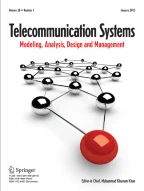Abstract
Spectrum sensing is not always perfect in practical cognitive radio networks. In this paper, two kinds of sensing errors are considered into the channel allocation scheme. Our work focuses on the cases that the channel availability varies fast during a channel allocation period, in which case the channel dynamics needs to be considered. The sensing errors are modeled to derive the metric of mean delay for each user-channel combination using the vacation queueing model. Further, the optimal resource allocation is determined based on the mean delay metric by bipartite graph matching. The simulation results indicate that the proposed mean delay metric can represent the transmission performance successfully, and the proposed resource allocation scheme is robust to sensing errors.
Similar content being viewed by others
Explore related subjects
Discover the latest articles, news and stories from top researchers in related subjects.References
Mitola, J., & Maguire, G. (1999). Cognitive radio: making software radios more personal. IEEE Personal Communications, 6(4), 13–18.
Haykin, S. (2005). Cognitive radio: Brain-empowered wireless communications. IEEE Journal on Selected Areas in Communications, 23, 201–220.
Huang, D., & Miao, C. (2008). Resource allocation of MU-OFDM based cognitive radio systems under partial channel state information. arXiv:0808.0549v2 [cs.IT], Aug.
Chen, Y., Yu, G., Zhang, Z., Chen, H., & Qiu, P. (2008). On cognitive radio networks with opportunistic power control strategies in fading channels. IEEE Transcations on Wireless Communications, 7(7), 2752–2761.
Geirhofer, S., Tong, L., & Sadler, B. (2006). A measurement-based model for dynamic spectrum access in WLAN channels. In Proc. IEEE Milcom 06, Oct.
Mishra, A. (2006). A multi-channel MAC for opportunistic spectrum sharing in cognitive networks. In Proc. IEEE Milcom 06, Oct.
Wang, W., Wang, W., Lu, Q., & Peng, T. (2009). An uplink resource allocation scheme for OFDMA-based cognitive radio networks. International Journal of Communication Systems, 22(5), 603–623.
Liu, X., & Shankar, S. N. (2006). Sensing-based opportunistic channel access. Mobile Networks and Applications, 11, 577–591.
Pawelczak, P., Prasad, R. V., & Hekmat, R. (2007). Waterfilling may not good neighbors make. In Proc. IEEE ICC 07, June.
Lang, K., Wu, Y., & Tsang, D. H. K. (2009). How to optimally schedule cooperative spectrum sensing in cognitive radio networks. In Proc. of AccessNets 2009.
Wong, D. T. C., Hoang, A. T., Liang, Y. C., & Chin, F. P. S. (2008). Dynamic spectrum access with imperfect sensing in open spectrum wireless networks. In Proc. of IEEE WCNC 2008, Apr.
Tang, S., & Mark, B. L. (2009). Modeling and analysis of opportunistic spectrum sharing with unreliable spectrum sensing. IEEE Transactions on Wireless Communications, 8(4), 1934–1943.
Wu, K., Wang, W., Luo, H., Yu, G., & Zhang, Z. (2010). Optimal resource allocation for cognitive radio networks with imperfect spectrum sensing. In Proc. of IEEE VTC 2010-Spring, May.
Kim, H., & Shin, K. G. (2008). Efficient discovery of spectrum opportunities with MAC-layer sensing in cognitive radio networks. IEEE Transactions on Mobile Computing, 7(5), 533–545.
Mitra, D. (1988). Stochastic theory of fluid model of producers and consumers coupled by a buffer. Advances in Applied Probability, 20.
Ausiello, G. et al. (2003). Complexity and approximation: combinatorial optimization problems and their approximability properties. Berlin: Springer.
Author information
Authors and Affiliations
Corresponding author
Additional information
Part of this work has been presented in IEEE VTC2010-Spring. This work is supported by National 973 Program under grant No. 2009CB320405, and National Natural Science Foundation of China under grant No. 61001098, 60972057, 60972058 and 60802012, Fundamental Research Funds for the Central Universities under grant No. 2010QNA5011, Scientific Research Fund of Zhejiang Provincial Education Department under grant No. Y200909796, and the open research fund of Key Laboratory of Information Coding and Transmission, Southwest Jiaotong University.
Rights and permissions
About this article
Cite this article
Wang, W., Wu, K., Luo, H. et al. Sensing error aware delay-optimal channel allocation scheme for cognitive radio networks. Telecommun Syst 52, 1895–1904 (2013). https://doi.org/10.1007/s11235-011-9472-x
Published:
Issue Date:
DOI: https://doi.org/10.1007/s11235-011-9472-x
